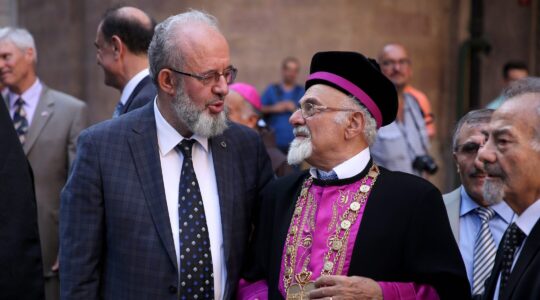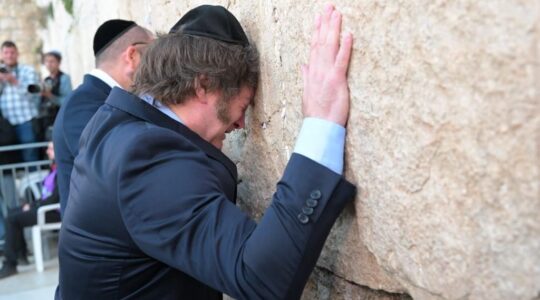BERLIN (JTA) — The opposition party in Berlin’s Jewish community said it was considering “further steps” following contentious local elections.
Emet finished second to the Koach party in the voting for the leadership of the largest Jewish community in Germany after final results came in Monday following the discovery of an unopened ballot box.
Koach finished with 13 seats on the 21-member Jewish community council to eight for Emet, which had claimed a clear majority until Monday morning. Emet said it suspected vote manipulation by Koach, led by incumbent president Gideon Joffe.
Joffe garnered 1,648 votes, to 1,542 for Emet’s candidate, Sergey Lagodinsky. During the campaign, Joffe shrugged off charges of corruption and lack of transparency as histrionics.
In a statement, Emet said the ballots in the unopened box were counted behind closed doors without the required neutral witness present. He also said inquiries about the exact results of the count were not answered.
“We reserve the right to take further steps,” Lagodinsky said in the statement.
Results on Sunday night had shown Emet winning in 11 out of 12 districts where members voted in person, according to its statement. This would have meant that all 17 Emet candidates would have been voted to the council, with Lagodinsky as president.
However, once absentee ballots were counted, “an opposite picture emerged, as had been feared ahead of the elections,” the statement
said. The absentee ballots alone would have reduced Emet’s number of representatives to 12, still a majority, but then the uncounted ballot box was discovered. It reportedly contained ballots delivered before Dec. 14.
“The discrepancy between the results in the polling stations and the absentee ballots, as well as the sudden discovery of a dubious extra
ballot box, must be carefully checked,” Lagodinsky said.
As of Monday afternoon, Koach had not responded to Emet’s statement or a JTA request seeking comment.
Local news reports said Joffe’s claims to have brought the community back into the black were exaggerated, citing lower state subsidies and unpaid pensions to former community employees.
The Berlin Jewish community, which has approximately 10,000 members, administers several synagogues and communal organizations; it is not limited to any denomination. Both Emet and Koach count Russian-speaking and postwar establishment Jews as supporters. As with all Jewish communities in Germany, funding subsidies come from the individual state.
JTA has documented Jewish history in real-time for over a century. Keep our journalism strong by joining us in supporting independent, award-winning reporting.





